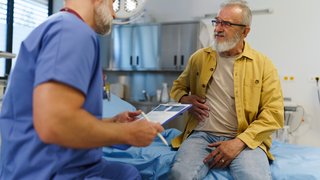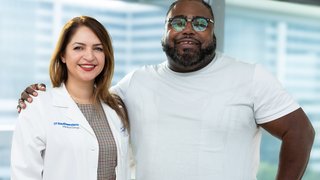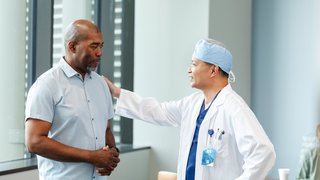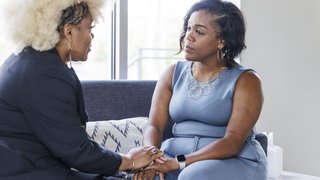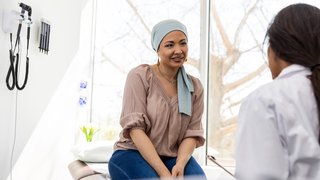
On the Rise
Colorectal cancer rates in young people are increasing, and 31-year-old Roberto Cowan knows firsthand what that looks like.
At 30 years old, Roberto Cowan was busy making a name for himself in his career as a sales manager for Medieval Times in Dallas, and he had an active social calendar. Colorectal cancer was the furthest thing from his mind. So when he started noticing blood in his stool in 2018, he didn’t think to get it checked right away.
“I have irritable bowel syndrome, so I kind of just assumed it was a symptom of that and maybe had something to do with the way I was eating,” Mr. Cowan says. “About a year went by before I mentioned it to my general practitioner.”
When that finally happened, his doctor ordered a colonoscopy, but Mr. Cowan still wasn’t too worried. He scheduled the test for three weeks later.
“I expected going into it that they would come out and tell me, ‘Oh, you’re young; everything’s fine.’ I expected them to tell me that I just needed to change my diet,” he says. “But no, I woke up and they said I had a mass in my colon.”
After seeing a proctologist, Mr. Cowan learned the mass was actually in his rectum and was cancerous.
“I couldn’t believe it,” he says. “I never even thought about people my age getting cancer.”
More Young Adults Getting Colorectal Cancer
Unfortunately, people Mr. Cowan’s age do get cancer, and more and more of them are getting colorectal cancer specifically. Colorectal cancer encompasses both colon cancer and rectal cancer, which share biological features.
“The incidence and mortality of colorectal cancer in adults over age 50 has been declining over the years, and we think that is probably due in part to increased screening leading to removal of precancerous lesions, decreased smoking, and improvements in treatment,” says Nina Sanford, M.D., a radiation oncologist at Simmons Cancer Center. “But since about the early ’90s, the incidence of what we call young-onset colorectal cancer has been gradually increasing and is expected to continue increasing over the next several decades.”
Doctors are unsure exactly what’s causing the increase but suspect environmental factors might play a role.
“There is speculation that lifestyle factors such as diet and decreased activity could be contributing to the increased incidence of colorectal cancer,” Dr. Sanford says, “but these remain active areas of investigation. Also, many young patients diagnosed with colorectal cancers previously led healthy lifestyles, so there must be other factors at play as well.”
For some patients, genetic factors might also play a role, particularly among the youngest adult patients.
One study found that more than a third of people who develop colorectal cancer before age 35 had a hereditary cancer syndrome as compared with 2% to 5% of all cases of colorectal cancer. Although more research is needed to say for sure, the numbers suggest genetics might be affecting younger patients more than older patients.
“Since about the early ’90s, the incidence of what we call young-onset colorectal cancer has been gradually increasing and is expected to continue increasing over the next several decades.”
Nina Sanford, M.D.

Younger Patients Diagnosed Later
Because young adults at average risk don’t get screened for colorectal cancer, their diseases are often diagnosed at later stages than older patients. As with Mr. Cowan, most young adults aren’t diagnosed until they see their doctor about symptoms that are bothering them. And by the time they experience symptoms, their cancer typically has already progressed beyond stage 1, which is the earliest stage.
Even physicians are sometimes caught off guard by the thought of colorectal cancer affecting their young adult patients. But if you have symptoms, you need to request a thorough diagnostic evaluation.
“Your physician might be thinking irritable bowel syndrome or inflammatory bowel disease, but if you are noticing danger signs – blood in the stool, unexplained weight loss, persistent abdominal pain and cramping, and a change in the consistency of your stool or not passing stool for several days – you should discuss with your physician further testing,” says Syed “Ali” Kazmi, M.D., a hematologist-oncologist at Simmons.
He notes that while younger patients usually have more advanced cancers, that doesn’t always translate to higher mortality rates.
“It depends on each individual person’s circumstances, of course, but generally younger patients can better tolerate higher doses of chemotherapy, so we can be more aggressive with treatment than with older patients who might have other comorbidities,” Dr. Kazmi says.
Choosing Simmons for Treatment
After Mr. Cowan received his diagnosis, he was referred to Simmons Cancer Center for treatment so he could participate in a clinical trial.
“I was excited to be accepted into a trial,” he says. “I was pretty much willing to do whatever I was told the best course of treatment was, so I was excited that I was getting an opportunity to participate in something that might help me even more.”
Typically, patients with colorectal cancer have chemoradiation therapy (a combination of chemotherapy and radiation delivered on the same days), followed by surgery and then more chemotherapy by itself. The trial Mr. Cowan is participating in is testing a different sequence of treatments and new trial drugs given during chemoradiation to improve its benefit.
“With the traditional approach, we were noticing that many patients were unable to complete chemotherapy after surgery because they were too fatigued from prior treatment and just didn’t have the strength to go through it,” Dr. Kazmi says. “In the trial, patients begin with chemotherapy and then get chemoradiation, and some, like Roberto, also get a trial drug. They then undergo surgery, allowing most patients to be able to get the full recommended treatment.”
Mr. Cowan is currently enrolled in the trial and received immunotherapy as a trial drug in combination with chemoradiation. His doctors say the early scans to assess response look promising.
“At my last CT scan and MRI, they found that the chemo had shrunk my tumor,” Mr. Cowan says. “So, that was very exciting.”
The Toll Cancer Takes on Young Adults
Mr. Cowan says he’s grateful to have the Simmons team by his side.
“I feel like it’s been a pretty expeditious process, and I’ve been happy with it,” he says. “I’ve been happy with everyone at UT Southwestern. It’s just been a wonderful experience.”
Still, cancer treatment is a lot for anyone to take on, especially for those who have other responsibilities on their plate.
“Young patients have really unique challenges to navigate in addition to a new cancer diagnosis,” Dr. Sanford says. “A lot of them are in the workforce, so they need to arrange time off work. Many are caring for young children or are concerned about their future fertility. And don’t forget, these patients don’t have Medicare, so they’re having to navigate the insurance and financial aspects of cancer as well.”
But perhaps the most difficult part of having cancer in one’s 30s is finding anyone to relate to.
“We often hear from these patients that they feel isolated,” Dr. Sanford says. “When they’re in the waiting room to get treatment, most of the other patients are a lot older; meanwhile, they might feel awkward talking to their parents and feel their friends might not fully understand.”
That definitely described Mr. Cowan. So he decided to do something about it.
“I’m part of a committee that’s starting up a Young Adult Support Group at UT Southwestern,” he says. “Basically, our idea is to provide a social aspect, a supportive aspect, and an educational aspect for people 18 to 39 who are going through treatment or have had cancer. It’s a very refreshing thing to be around people your own age who have cancer. It’s really weird, but it’s like a weight off your shoulders just to be able to talk and relate to someone.”
Roberto Cowan
Colorectal cancer was the furthest thing from Roberto's mind. So when he started noticing blood in his stool in 2018, he didn’t think to get it checked right away. Watch Roberto’s journey through his treatment at UT Southwestern Simmons Cancer Center and his experience in the Young Adult Cancer Support Group and how they have changed his life.
Schedule a colorectal cancer screening today.




